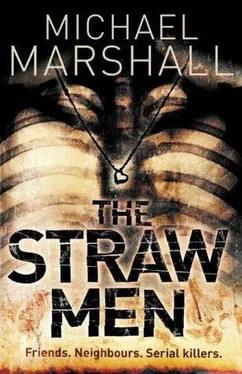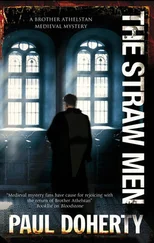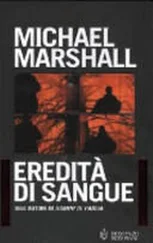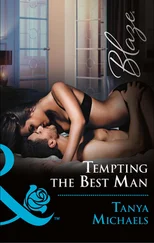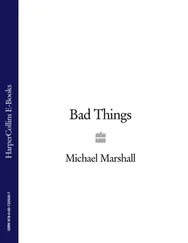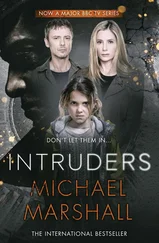something more than water.'
'What do you want?'
'I need food. Something to eat.' She coughed. She seemed to be coughing a lot now, and when she did it made her feel nauseous.
'We eat too much these days,' the man said. 'Far too much. It's killed for us and grown by the ton and then delivered to our door and we sit like pigs at the trough. We're not even hunters any more. Just scavengers. Hyenas with coupons who pick through the shrink-wrapped leavings of people we've never
even met.'
'If you say so. But I have to eat.'
'I have to eat I have to eat I have to eat,' the man chanted. He seemed to like the sound the words
made, and continued repeating the sentences for some minutes. Then he was silent for a while, before observing: 'Once we would go for days without food. We were
lean.'
'Right, the Great Depression. Dust Bowl years, blah.'
The man laughed. 'That was yesterday and of no interest to us. I meant before the invasion.'
'The invasion?' Sarah asked — thinking: Okay, here we get to it. Little green men. The Russians. The Jews. Whatever. She coughed violently again, and for a moment everything went white in front of her eyes, and when he answered his voice sounded as if it was coming from a long way off or as if he was using one of those things like Cher did when she sang 'Believe'.
'Yes, invasion. What else would you call it?' he asked.
She swallowed, screwed her eyes shut and then opened them again. 'I wouldn't call it anything. I'm
too hungry.'
'You can't have any food.'
Something in the man's voice made her suddenly very afraid. He didn't sound like he meant she just couldn't have any today. He sounded like he meant she couldn't have any, period. In a surprisingly short time she had adapted to her current circumstances, aided by an increasing sense of dislocation. But the threat of nothing to eat, ever, was enough to momentarily jog her completely back to reality.
'Look,' she said, voice unsteady now, 'you must want something from me. There must be some reason you are doing this. Please just get on with what you want and either kill me or give me some food. I have to have something to eat.'
'Open your mouth.'
She did so eagerly, saliva immediately flooding into her mouth. For a moment nothing happened, and then a hand appeared. It wasn't holding anything that looked like food, but only a small piece of white paper. The hand pressed it to her tongue briefly, and then withdrew. Sarah started to cry.
The man said nothing for a while, and then tutted. 'No change,' he said. 'Stubborn little genome.' The piece of white paper fluttered down into the hole to lie beside her. 'You haven't really learned anything,
have you?'
She sniffed. 'You haven't told me anything.'
'I'm beginning to wonder about you,' he said. 'I thought you were different. That you might change. I
came for you personally. I had plans for us. But now I'm Wondering if you'll do after all.'
'Oh yes? Why's that?'
'You're lazy and spoiled and not coming on very well.'
'Yeah? Well you're a wacko.'
'And you're a silly little bitch.'
'Fuck you,' she said. 'You're a fucking nutcase and I'm going to escape and smash your head in.
She kept her mouth shut as he poured the water.
He hadn't come back for a long time.
19
We got to Hunter's Rock at three o'clock in the morning, after a short flight and a long drive. When we landed in Oregon I drove down the highway over the state line, and then along roads that I recalled from long ago — feeling as if I were retracing the steps of an explorer I'd only read about, rather than revisiting old ground of my own. Gradually we began to pass places I had known better, and it got harder. I chose routes that I would not have taken for directness. I think Bobby realized. He didn't say anything.
Eventually we stopped at an old motel I didn't recognize, twenty miles out of town. I had been all for sleeping in the car, but Bobby, ever practical, pointed out we'd do a better day's work if we got a few hours in a bed. We walked over and banged on the door to the office. After a pretty long time a man in a T-shirt and pyjamas emerged, and was frank in expressing his dissatisfaction at our presence. We allowed that the hour was late, but suggested that now he was awake he might as well turn a buck by giving us a twin room.
He took a long look at us. 'You a couple of perverts?'
We looked back at him, and he evidently decided that worse than renting to two potential homosexuals was the prospect of having those same homosexuals beat the living crap out of him in the middle of the night. He handed me a key.
Bobby lay down on one of the beds and went straight to sleep. I tried to do the same, but couldn't get it to stick. Eventually I got back up and left the room. I bought a pack of cigarettes from the machine and went out to the centre of the old court, where a rusty fence surrounded the remains of a swimming pool. I pulled a battered chair up to one end and sat there in the darkness. There was no light apart from the dusty pink of the VACANCY sign over the office, a smudge of moon, some glints off peeling hard surfaces. I got out the gun Bobby had given me and looked at it for a while. It didn't have much of interest to say, so I put it back in my jacket.
Instead I stared at the shadows of the empty pool, wondering how long it had been empty. Quite a time, by its appearance: the sides were cracked and the six inches of sludge at the bottom looked as if it could have provided the forum for the first emergence of life. Once it had been full of cool water, and families would have gratefully dispatched their children to it, glad of the relief after a long drive. The sign for the motel, faded and unloved though it was, dated it to the late fifties. I could picture the way life had been then, but only as still images: snapshots of the glory years, the colours slightly off and everything frozen in an advertisement for the kind of life we've always been promised is inevitable. A backyard of sweetness and light, cookouts and firm handshakes, of hard work and true love and fair play. The way life is supposed to be. Instead we wander about, short on charisma and direction and script — and in the end the whole business just stops and we realize no one was watching anyway. We're so used to events being portrayed in particular ways that when they actually happen to us, and our life bears no resemblance to expectation, we don't really know how we're supposed to respond. Our lives are unrecognizable to us. Should we still try to be happy, when everything seems so flawed and out of kilter and grey? How are we supposed to be content, when everything on television is so much better?
I believed that Bobby had already found the truth, and that my birth was not recorded in Hunter's Rock, but I had to check for myself. All of the time I'd been driven around by Chip Farling, my childhood had been pulling at me with cold fingers. If my parents had gone somewhere else for my birth, maybe it wasn't that important. Could be they'd gone away for the weekend, a last chance before their family expanded, and had been caught short somewhere far from home. But surely that was the kind of story you tell your child, the kind of anecdote that makes each life unique? I could only assume that it had
not been revealed because of the fact that wherever this birth had taken place, it had been of twins. Why this should have made a difference, and why they had done what they had gone on to do, I still had no idea. Perhaps this was the gap that I had unconsciously sculpted my life around. Everyone feels that way some of the time. But I felt it a lot. And maybe I'd finally found out why.
I don't know how long the noise had been going on. Not long, I think. But gradually I realized that I could hear a quiet lapping sound. It seemed very close by, so close that I turned in my seat. There was nothing behind me. When I turned round again I realized I had misjudged the direction, and that it was coming from the far end of the pool. It was a little too dark to see, but it sounded as if water was sloshing quietly into the far end. I sat forward in my chair, surprised. The water in the pool was getting a little deeper: slowly, but noticeably. It was no longer only a few inches deep, but about a foot. It was only then that I realized that there were two people in the pool. Right down at the far end. One was a little taller than the other, and both were at first no more than bulky shadows. They were holding hands as they struggled forward, pushing against the viscous water as it rose. The watery sounds got louder as the pool began to fill more quickly, and the movement of the figures became more vigorous as they tried to come up toward the shallow end, up towards me.
Читать дальше
